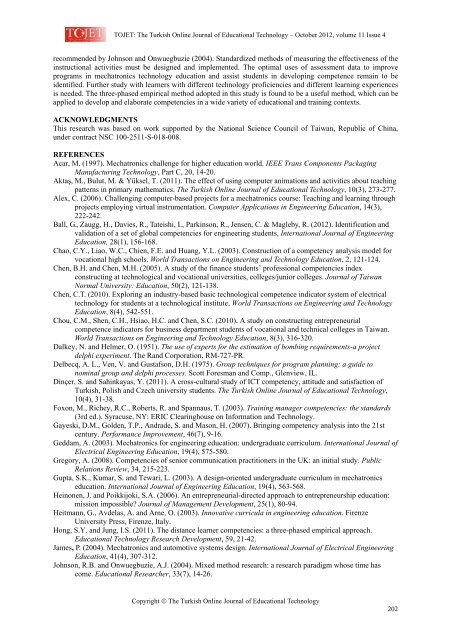october 2012 - TOJET the Turkish online journal of educational ...
october 2012 - TOJET the Turkish online journal of educational ...
october 2012 - TOJET the Turkish online journal of educational ...
You also want an ePaper? Increase the reach of your titles
YUMPU automatically turns print PDFs into web optimized ePapers that Google loves.
<strong>TOJET</strong>: The <strong>Turkish</strong> Online Journal <strong>of</strong> Educational Technology – October <strong>2012</strong>, volume 11 Issue 4<br />
recommended by Johnson and Onwuegbuzie (2004). Standardized methods <strong>of</strong> measuring <strong>the</strong> effectiveness <strong>of</strong> <strong>the</strong><br />
instructional activities must be designed and implemented. The optimal uses <strong>of</strong> assessment data to improve<br />
programs in mechatronics technology education and assist students in developing competence remain to be<br />
identified. Fur<strong>the</strong>r study with learners with different technology pr<strong>of</strong>iciencies and different learning experiences<br />
is needed. The three-phased empirical method adopted in this study is found to be a useful method, which can be<br />
applied to develop and elaborate competencies in a wide variety <strong>of</strong> <strong>educational</strong> and training contexts.<br />
ACKNOWLEDGMENTS<br />
This research was based on work supported by <strong>the</strong> National Science Council <strong>of</strong> Taiwan, Republic <strong>of</strong> China,<br />
under contract NSC 100-2511-S-018-008.<br />
REFERENCES<br />
Acar, M. (1997). Mechatronics challenge for higher education world. IEEE Trans Components Packaging<br />
Manufacturing Technology, Part C, 20, 14-20.<br />
Aktaş, M., Bulut, M. & Yüksel, T. (2011). The effect <strong>of</strong> using computer animations and activities about teaching<br />
patterns in primary ma<strong>the</strong>matics. The <strong>Turkish</strong> Online Journal <strong>of</strong> Educational Technology, 10(3), 273-277.<br />
Alex, C. (2006). Challenging computer-based projects for a mechatronics course: Teaching and learning through<br />
projects employing virtual instrumentation. Computer Applications in Engineering Education, 14(3),<br />
222-242.<br />
Ball, G., Zaugg, H., Davies, R., Tateishi, I., Parkinson, R., Jensen, C. & Magleby, R. (<strong>2012</strong>). Identification and<br />
validation <strong>of</strong> a set <strong>of</strong> global competencies for engineering students, International Journal <strong>of</strong> Engineering<br />
Education, 28(1), 156-168.<br />
Chao, C.Y., Liao, W.C., Chien, F.E. and Huang, Y.L. (2003). Construction <strong>of</strong> a competency analysis model for<br />
vocational high schools. World Transactions on Engineering and Technology Education, 2, 121-124.<br />
Chen, B.H. and Chen, M.H. (2005). A study <strong>of</strong> <strong>the</strong> finance students’ pr<strong>of</strong>essional competencies index<br />
constructing at technological and vocational universities, colleges/junior colleges. Journal <strong>of</strong> Taiwan<br />
Normal University: Education, 50(2), 121-138.<br />
Chen, C.T. (2010). Exploring an industry-based basic technological competence indicator system <strong>of</strong> electrical<br />
technology for students at a technological institute, World Transactions on Engineering and Technology<br />
Education, 8(4), 542-551.<br />
Chou, C.M., Shen, C.H., Hsiao, H.C. and Chen, S.C. (2010). A study on constructing entrepreneurial<br />
competence indicators for business department students <strong>of</strong> vocational and technical colleges in Taiwan.<br />
World Transactions on Engineering and Technology Education, 8(3), 316-320.<br />
Dalkey, N. and Helmer, O. (1951). The use <strong>of</strong> experts for <strong>the</strong> estimation <strong>of</strong> bombing requirements-a project<br />
delphi experiment. The Rand Corporation, RM-727-PR.<br />
Delbecq, A. L., Ven, V. and Gustafson, D.H. (1975). Group techniques for program planning: a guide to<br />
nominal group and delphi processes. Scott Foresman and Comp., Glenview, IL.<br />
Dinçer, S. and Sahinkayas, Y. (2011). A cross-cultural study <strong>of</strong> ICT competency, attitude and satisfaction <strong>of</strong><br />
<strong>Turkish</strong>, Polish and Czech university students. The <strong>Turkish</strong> Online Journal <strong>of</strong> Educational Technology,<br />
10(4), 31-38.<br />
Foxon, M., Richey, R.C., Roberts, R. and Spannaus, T. (2003). Training manager competencies: <strong>the</strong> standards<br />
(3rd ed.). Syracuse, NY: ERIC Clearinghouse on Information and Technology.<br />
Gayeski, D.M., Golden, T.P., Andrade, S. and Mason, H. (2007). Bringing competency analysis into <strong>the</strong> 21st<br />
century. Performance Improvement, 46(7), 9-16.<br />
Geddam, A. (2003). Mechatronics for engineering education: undergraduate curriculum. International Journal <strong>of</strong><br />
Electrical Engineering Education, 19(4), 575-580.<br />
Gregory, A. (2008). Competencies <strong>of</strong> senior communication practitioners in <strong>the</strong> UK: an initial study. Public<br />
Relations Review, 34, 215-223.<br />
Gupta, S.K., Kumar, S. and Tewari, L. (2003). A design-oriented undergraduate curriculum in mechatronics<br />
education. International Journal <strong>of</strong> Engineering Education, 19(4), 563-568.<br />
Heinonen, J. and Poikkijoki, S.A. (2006). An entrepreneurial-directed approach to entrepreneurship education:<br />
mission impossible? Journal <strong>of</strong> Management Development, 25(1), 80-94.<br />
Heitmann, G., Avdelas, A. and Arne, O. (2003). Innovative curricula in engineering education. Firenze<br />
University Press, Firenze, Italy.<br />
Hong, S.Y. and Jung, I.S. (2011). The distance learner competencies: a three-phased empirical approach.<br />
Educational Technology Research Development, 59, 21-42.<br />
James, P. (2004). Mechatronics and automotive systems design. International Journal <strong>of</strong> Electrical Engineering<br />
Education, 41(4), 307-312.<br />
Johnson, R.B. and Onwuegbuzie, A.J. (2004). Mixed method research: a research paradigm whose time has<br />
come. Educational Researcher, 33(7), 14-26.<br />
Copyright © The <strong>Turkish</strong> Online Journal <strong>of</strong> Educational Technology<br />
202
















